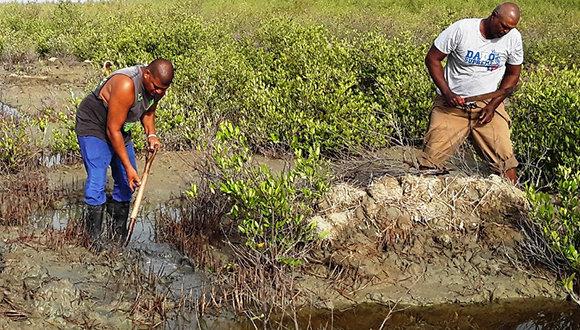 Guantanamo – The implementation of the State Plan to confront climate change (Tarea Vida) is advancing in Guantanamo province with actions to counteract the phenomenon effects in all municipalities, mainly in Baracoa, a national priority zone, and in the semi-arid zone of the local southern coast.
Guantanamo – The implementation of the State Plan to confront climate change (Tarea Vida) is advancing in Guantanamo province with actions to counteract the phenomenon effects in all municipalities, mainly in Baracoa, a national priority zone, and in the semi-arid zone of the local southern coast.
With 136 actions this year, of which 110 include investments, the different actors such as the agriculture delegations, Water Resources, the Institute of Land Management, among others, to preserve natural resources, ecosystems and population settlements.
As part of the comprehensive strategy, 1.5 hectares of mangrove forests were restored on Baracoa northern coast and the international Green Basins project was concluded, which provided funds for the implementation of ecosystem-based measures to mitigate the effects of and adapt to climate change.
In addition, we are working directly with producers in 43 farms to promote the application of agroecological techniques to increase local food production, based on a better use of traditional varieties and crops.
The actions also include scientific-technical services for the productive sector through agrometeorological, climate, fire and drought bulletins prepared by specialists of the Provincial Meteorological Center, which contribute to the adoption of pertinent measures in each case.
The evaluation of the Habitat Management Plan and the task “Transformation of Neighborhoods” is also carried out, as well as the evaluation of the Urban Management Plan of Caimanera, Imías and San Antonio del Sur.
As part of La Tarea Vida in Guantanamo, the different actors implement actions for the adequate management of water resources, soils and forests, as well as studies of new areas to relocate communities vulnerable to coastal flooding or river flooding, mainly in the prioritized areas of Baracoa and the Southern Coastal Strip.
Translated and edited by Dayla Perez Ortiz